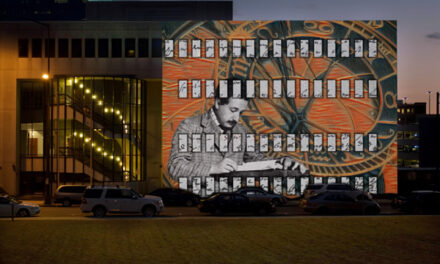 In the 1980s, the great jazz trumpeter Miles Davis had moved from cultivating the cool to controversial explorations of funk and pop. For the most part, his new wave of music was panned by critics (like in the famously ruthless article “On the Corner: The Sellout of Miles Davis,” where jazz writer Stanley Crouch said Davis had “turned butt to the beautiful in order to genuflect before the commercial”). Davis, however, argued he was trying to reestablish jazz’s place within the popular scene – or, at least, his own place. In a 1982 television interview, Davis declared that he actually “didn’t like that word, ‘jazz.'” “I think social music,” Davis continued. “All the social melodies out in the air.”
In the 1980s, the great jazz trumpeter Miles Davis had moved from cultivating the cool to controversial explorations of funk and pop. For the most part, his new wave of music was panned by critics (like in the famously ruthless article “On the Corner: The Sellout of Miles Davis,” where jazz writer Stanley Crouch said Davis had “turned butt to the beautiful in order to genuflect before the commercial”). Davis, however, argued he was trying to reestablish jazz’s place within the popular scene – or, at least, his own place. In a 1982 television interview, Davis declared that he actually “didn’t like that word, ‘jazz.'” “I think social music,” Davis continued. “All the social melodies out in the air.”
Davis’ idea of “social music” caught on, but it remained vague, an all-purpose alternative to capture the kind of genre-bending popular music – part jazz/funk/rock/R&B/electronic – that he delved into at the end of his career. His experimental social music, however, did have one clear mission: to engage with a wide audience. Social music should feed off of the crowd (i.e., “all the social melodies out in the air”) and then, social music should feed the crowd.
The Bechtler Museum of Modern Art‘s March 5 “Jazz at the Bechtler” livestream featuring world-renowned harmonicist Frédéric Yonnet nodded to Davis’ concept of social music. Yonnet, accompanied by the Bechtler’s resident Ziad Jazz Quartet, grooved through funky renditions of pop songs like Tears for Fears’ “Everybody Wants to Rule the World” and Childish Gambino’s “Feels Like Summer,” adapting contemporary tunes with rock and funk rhythms and call and response improvisation between musicians, all doing so through the voice of the traditionally blues-associated harmonica.
Yonnet, who is French but now lives in Washington, D.C., has become the harmonica player of today: His credits include touring with Stevie Wonder (the master of the harmonica and Yonnet’s greatest influence), Prince, John Legend, and Ed Sheeran. In 2018, Yonnet presented his very own Tiny Desk Concert on NPR and in 2019, Yonnet’s harmonica was the central musical voice for Martin Scorsese’s The Irishman. It’s easy to see why Yonnet has come to such acclaim: He is virtuosic on the harmonica in a way that few are – he seemingly sings through it. He covers the microphone and harmonica almost completely with his hands while he blows, hiding the source of sound and, if you didn’t know any better, you wouldn’t believe that it was all coming from that modest piece of medal.
The band, illuminated by a grid background of lights, played through several tunes, all fairly similar in feel with a tight groove maintained by Al Sergel on drums, Ron Brendle on electric bass, and Noel Freidline on keyboards. Rabie accompanied Yonnet up front on saxophones. For the most part, the image and sound quality were clear, and the setting of Charlotte’s oldest music production facility, The Playroom, enhanced the cool atmosphere that the musicians established.
Yonnet is known for his charismatic performance and stage presence, and even through livestream, he made a point of acknowledging viewers: “We feel your energy,” he said. Apparently, the concert also had a small, distanced live audience, which Yonnet encouraged to clap along and applaud. Of course, despite the ‘energy’ that Yonnet mentioned he felt from afar, there were still times where the at-home viewer lacked that energy – particularly the one that comes from being in a real audience. For one thing, at the end of each piece, naturally, there was no applause (or little, from the live audience). During each piece, the musicians built up a tension, a force that had them dancing, panting, and sweating during solos with crescendos and decrescendos and cymbal crashes, and through the screen, we could almost feel the vibrations. But when each experience came to an end, there could be no communal realization of the journey that had just taken place. Additionally, when, during solos, musicians made musical allusions – most notably Freidline quoting The Beatles’ “Eleanor Rigby” – we missed the chance to laugh or cheer together; inside jokes are most funny when you’re all inside to share them together.
Can social music occur socially distanced? Without an audience to feed or feed off of, it becomes very difficult. Yonnet and the Ziad Jazz Quartet played enthusiastically and did appear to be enjoying themselves, but I’m sure this concert (and all the other livestreams that musicians have been doing for a year, now) was difficult, or at least different, to play. For the at-home audience, though we, too, enjoyed ourselves, we missed that musical communion that is only felt from hearing in-person. Virtual Jazz at the Bechtler will continue on the first Friday of each month, the next being on April 2. See the sidebar for more details.











